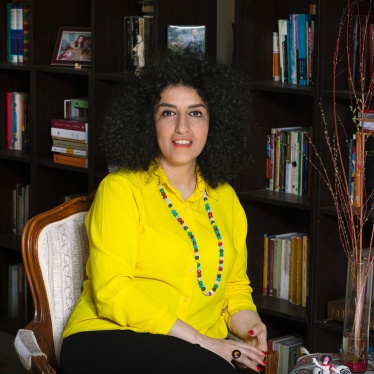(Tokyo) - The Japanese government should use the upcoming state visit by the Turkmen president to raise concerns about the appalling human rights situation in Turkmenistan and to press for concrete improvements, Human Rights Watch said today. President Gurbanguly Berdymukhamedov is scheduled to begin a three-day visit to Japan on December 16, 2009, during which he is expected to meet with Prime Minister Yukio Hatoyama and the Emperor Akihito.
Unknown numbers of political prisoners languish in Turkmenistan's prisons and draconian restrictions on the rights to freedom of expression, association, assembly, movement, and religion remain in place. Independent civil society and media cannot operate openly, if at all. The government threatens, harasses, and arrests those who question its policies, however modestly.
"The Turkmen government is one of the most repressive in the world, on par with Burma and North Korea," said Holly Cartner, Europe and Central Asia director at Human Rights Watch. "Japan is in a strong position, with business deals and aid on the agenda and it needs to make clear that human rights reform is essential to a successful relationship."
The visit was announced in August under the previous Japanese government. Since then, Japanese and Turkmen business leaders have reportedly met several times to discuss stronger business ties, including gas and oil projects. A bilateral business conference is scheduled during the visit, suggesting that discussions of investment and business deals are likely to dominate the agenda. It is also likely that Japan will announce a significant increase in aid to Turkmenistan.
Japan's official development aid (ODA) charter makes clear that decisions on aid should take into account the recipient country's human rights record, yet Japan is only known to have invoked this principle in its decisions on aid to Burma and Zimbabwe.
New restrictions on travel imposed by the Turkmen government during the summer, preventing students enrolled in private universities abroad from leaving Turkmenistan, is among the specific concerns Human Rights Watch urged Japan's leadership to raise.
"While the Turkmen president tours Japan, hundreds of students are effectively held prisoner in their own country, arbitrarily deprived of education of their choice," Cartner said. "Japan's leaders should press the Turkmen president to lift these outrageous restrictions and to take other immediate steps to remedy abuses."
Human Rights Watch also encouraged Japan to press the Turkmen government for the following concrete reform steps:
- Free all those imprisoned for political reasons, including the human rights activists Annakurban Amanklychev and Sapardurdy Khajiev and the dissident Gulgeldy Annaniazov;
- Establish a nationwide, transparent process to review all cases of political imprisonment to establish the real number of prisoners held on politically motivated charges, and ensure that victims of abuse are provided redress;
- Lift travel bans on activists and relatives of opposition members, and dismantle the system that allows for interference with citizens' ability to leave and return to Turkmenistan;
- Allow activists, civic groups, and journalists to operate freely and without fear of persecution;
- Ensure access to the country, including to places of detention, for independent human rights monitors and extend invitations to all United Nations monitors who have requested access.
Background
Turkmenistan's human rights record is marked by numerous egregious abuses. President Berdymukhamedov came to power in December 2006 after the death of the self-declared president-for-life, Saparmurat Niazov, who ruled the country for 21 years. In the first year of his presidency, Berdymukhamedov dismantled some of the most excessive and ruinous social policies of his predecessor, but these measures did not result in genuine reforms affecting human rights.
Hundreds of people, perhaps more, languish in Turkmen prisons on what appear to be politically motivated charges. The lack of transparency in the Turkmen justice system, including closed trials and the absence of independent human rights monitoring, make it impossible to reliably determine the number of political prisoners or evaluate the legitimacy of the charges against them.
Prominent political prisoners include human rights activists Annakurban Amanklychev and Sapardurdy Khajiev, affiliated with a Turkmen human rights group in exile and sentenced in a closed trial in 2006 to seven years in prison on trumped-up charges of possession of ammunition. Another political prisoner is political dissident Gulgeldy Annaniazov, a former political prisoner who returned to Turkmenistan in June 2008 from Norway, where he holds refugee status, only to be arrested the very next day and sentenced in October 2008 to 11 years in prison.
Turkmenistan remains closed to independent human rights monitors, including Human Rights Watch, which has been unable to visit the country for 10 years. In September 2008, the UN special rapporteur on freedom of religion became the first UN special rapporteur to visit the country, but the government has refused to grant invitations to nine other UN monitors despite their longstanding requests for access.
Because of its vast gas reserves, many international actors, including the United States and the European Union, are actively pursuing closer relations with Turkmenistan.






